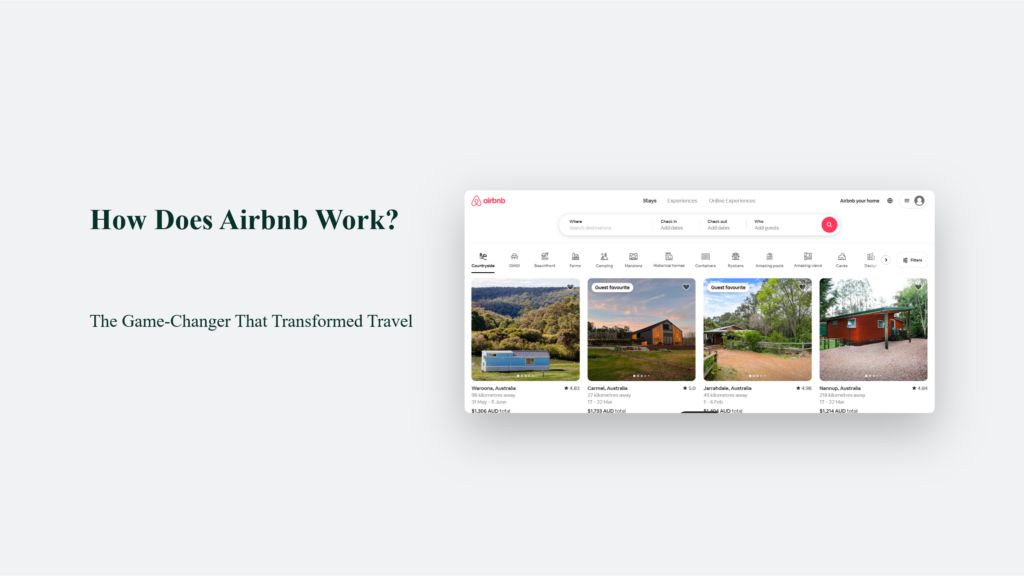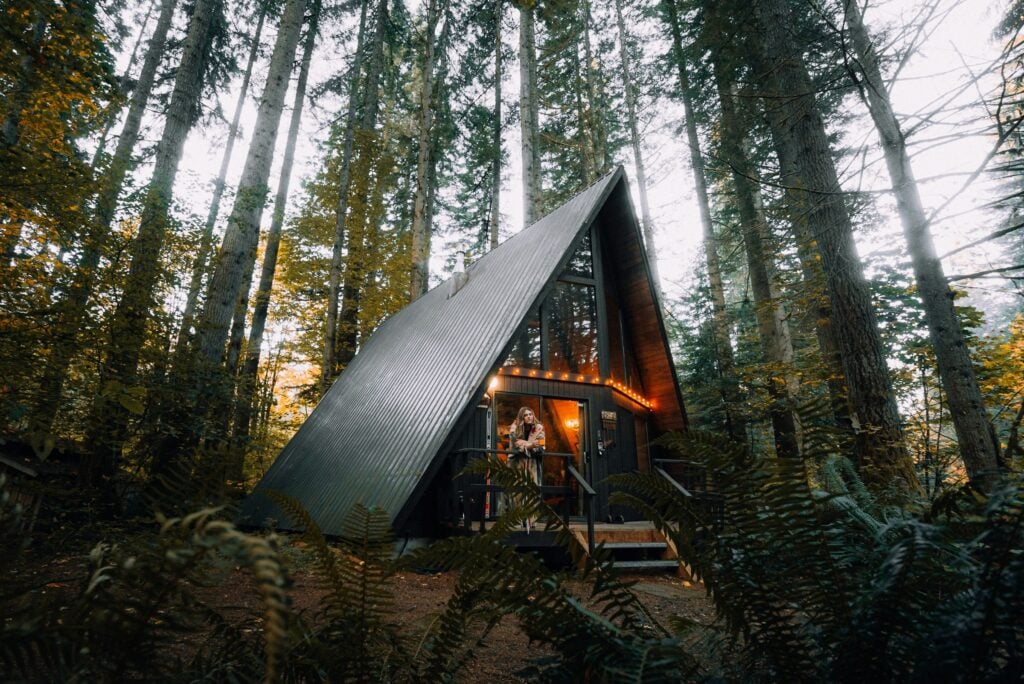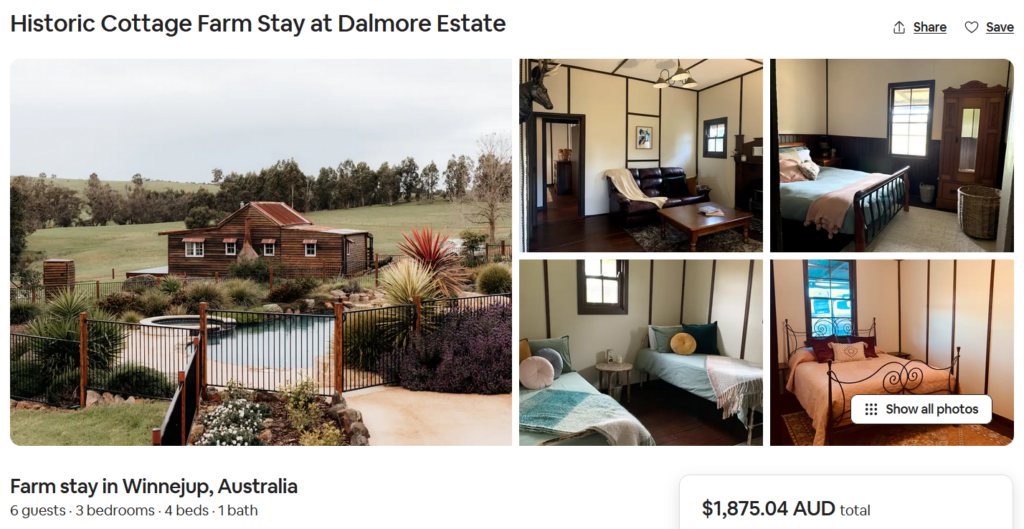Ever wondered how Airbnb, the largest vacation rental site, morphed from an idea involving air mattresses to a global sensation in the travel industry? Well, buckle up for a deep dive into how does Airbnb work, where every stay tells a story, and every host has a tale.

Key Takeaways:
- Airbnb revolutionized the travel industry by offering unique, affordable lodging options.
- Pricing on Airbnb includes various fees, not just the nightly rate.
- Airbnb Experiences offers unique local activities for travellers.
- Airbnb is a platform for hosts to earn extra income and connect with people worldwide.
- Safety and reviews are crucial aspects of the Airbnb experience.
- Airbnb’s impact on the travel industry is significant, but not without its challenges.
The Birth of Airbnb:
The origin story of Airbnb is a fascinating tale of innovation and entrepreneurship. It all began in 2007 when CEO Brian Chesky and his co-founders sought a way to earn extra money. They spotted an opportunity when a design conference in San Francisco led to a shortage of hotel rooms. Chesky and his roommates decided to rent out air mattresses in their apartment, creating a makeshift bed-and-breakfast.
This initial concept quickly evolved. By 2009, what started as “Air Bed and Breakfast” had transformed into Airbnb, a platform that redefined the travel industry by connecting people with unique, local accommodations worldwide. This shift from a simple room-renting idea to a global phenomenon was driven by the founders’ vision of providing more than a place to stay. They aimed to offer an experience that allowed travellers to live like locals.
Airbnb’s growth was not without challenges. The company underwent multiple iterations and faced various obstacles, including funding issues and regulatory hurdles. Despite these challenges, Airbnb’s innovative approach to lodging — leveraging technology to facilitate peer-to-peer rental agreements — allowed it to gain traction and popularity among travellers seeking more authentic, cost-effective, and diverse lodging options than traditional hotels could offer.
The company officially rebranded as Airbnb in 2009, setting the stage for its later expansion into offering experiences and adventures, further diversifying the travel experience for its users. This growth trajectory culminated in Airbnb going public in 2020, marking a significant milestone in its journey from a startup to a leading player in the global travel industry.
Airbnb’s story highlights the power of a simple idea, backed by innovation and a clear understanding of consumer needs, to revolutionise an entire industry. It’s a testament to how thinking outside the box and leveraging technology can lead to extraordinary success in modern business.

How Does Airbnb Work for Guests?
Airbnb operates as a user-friendly online platform, catering to guests looking for accommodations that offer a more personalised touch than traditional hotels. Here’s an overview of how Airbnb works for guests:
Searching and Booking on Airbnb:
Creating an Account:
First, guests must create an Airbnb account. They can do this by providing basic information like name and email address and agreeing to Airbnb’s community standards, which emphasize equality and non-discrimination.
Searching for Properties:
To start the booking process, guests use Airbnb’s website or app. They input their desired location, travel dates, and the number of guests. Airbnb then displays a list of available properties, ranging from private rooms in shared homes to entire houses or unique accommodations like treehouses or castles.
Choosing and Booking:
Guests can browse through the listings, viewing details about the space, amenities, house rules, safety features, and reviews from previous guests. Once a suitable property is found, they can proceed to book it. Most listings show the nightly rate upfront, but it’s important to note that the total cost may include additional fees like cleaning, service, and taxes.
Secure Payment:
Payment is made through Airbnb’s secure online system, which may include options like PayPal, direct deposit, or credit cards. Guests pay the entire amount when booking and Airbnb holds the payment until 24 hours after check-in before releasing it to the host. It ensures that guests have time to confirm that the property meets their expectations.
Key Points to Consider:
- Pricing Transparency: While the initial nightly rate is displayed, guests should know additional fees that can impact the total cost. It includes cleaning fees, service fees, and local taxes.
- Reviews and Ratings: Guests can and should read reviews of properties and hosts to gauge what to expect. Reviews are a critical part of Airbnb’s system, helping to maintain standards and trust within the community.
- Safety Features: Airbnb encourages hosts to provide safety features like smoke and carbon monoxide detectors. Guests should check listings for these features to ensure their safety during their stay.
- Communication with Hosts: For non-instant book listings, it’s recommended to message the host beforehand to confirm availability. Airbnb provides information on the host’s response rate and time, helping guests gauge how quickly they can expect an answer.
- Unique Stays and Experiences: Beyond just accommodation, Airbnb offers “Experiences” like local tours, classes, and activities, providing guests with opportunities to immerse themselves in local culture and activities.
In essence, Airbnb provides a platform for guests to find and book diverse and unique accommodations around the world. The site focuses on local experiences, ease of use, and community-driven reviews and standards. This system offers a more personal touch to travel, often at a more affordable price compared to traditional hotels.
Understanding Airbnb Pricing:

Understanding Airbnb pricing requires a closer look at the components that add up to your final amount. When you see a property listed, for instance, at $117 per night, this is usually just the base price. The final cost often includes several additional fees and taxes, which can significantly increase the total amount.
Base Price (Nightly Rate):
- It is the amount set by the host for staying per night. It’s the most visible cost and what initially attracts most guests.
Cleaning Fees:
- The host charges These one-time fees to cover the cost of cleaning their space after a guest’s stay. According to a NerdWallet analysis, the median cleaning fee for a one-night Airbnb stay was $75. This fee can vary widely depending on the property and the host
Service Fees:
- Airbnb charges a service fee, a percentage of the total booking cost (including the nightly rate and cleaning fee). This fee goes to Airbnb to cover the costs of running the platform and providing services like customer support.
Taxes:
- Local taxes may be applied to the booking depending on the property’s location. Local governments set these taxes and can include sales tax, tourist tax, or other municipal charges.
Additional Fees:
- Some listings may have additional fees set by the host, such as fees for extra guests, pet fees, or deposits for potential damages.
Variation in Total Cost:
- The sum of these fees and taxes can lead to a significant difference between the listed nightly rate and the total cost of the stay. For example, a room listed at $117 per night could cost much more after adding all the additional fees and taxes.
The Airbnb Experience Beyond Stays:
Airbnb transcends traditional accommodation options by offering Airbnb Experiences, a feature that allows travellers to delve into local cultures through unique activities. These experiences range from cooking classes in Italy, where you can learn to make pasta from scratch to photography sessions in Paris, capturing the city’s essence through a lens.
These activities are led by local experts, offering an authentic glimpse into the heart of each destination. It’s not just a stay; it’s about creating memorable experiences and connections with the local culture and community.
How Does Airbnb Work for Hosts?
Airbnb provides an intriguing and flexible opportunity for individuals to become hosts and monetise their extra space. This could range from renting a spare room to an entire house or even unique accommodations like treehouses or boats. The process is quite straightforward but involves several key aspects.
Becoming a Host on Airbnb
- List Your Space: Hosts begin by listing their space on Airbnb. It involves describing the space, setting house rules, and uploading photos. Airbnb offers guidance on how to make your listing stand out.
- Set Your Price: Hosts completely control how they price their spaces. Location, size, amenities, and local demand play a significant role in setting competitive prices. Airbnb provides tools to help hosts understand pricing trends in their area.
- Manage Your Listing: Hosts manage their listings through the Airbnb platform. It includes updating availability, responding to guest inquiries, and adjusting pricing or house rules as needed.
Benefits for Hosts
- Financial Gains: One of the primary benefits for hosts is the potential for earning additional income. The amount can vary widely depending on location, property type, and occupancy rate.
- Flexibility: Hosting on Airbnb offers flexibility. Hosts can decide when they want to rent out their space and for how long. It can particularly benefit those who only want to host occasionally or seasonally.
- Cultural Exchange: Hosting guests worldwide offers a unique opportunity for cultural exchange. Hosts often enjoy meeting people from different backgrounds and sharing local insights.
Responsibilities and Challenges
- Guest Interaction: Effective communication with guests is crucial. It includes coordinating check-ins, addressing issues during their stay, and providing local recommendations.
- Maintenance and Upkeep: Hosts are responsible for maintaining their space and ensuring it is clean and comfortable for guests. It can involve cleaning between guests, regular maintenance, and occasionally dealing with damages.
- Adhering to Regulations: Hosts must know and comply with local regulations, including zoning laws, tax obligations, and health and safety standards.
- Handling Reviews: Managing and responding to guest reviews is integral to being a host. Positive reviews can significantly enhance a listing’s attractiveness, while negative reviews may require thoughtful responses and improvements.
Tools and Support Provided by Airbnb
- Host Guarantee: Airbnb offers a program that protects against property damage. However, hosts are encouraged to have their insurance as well.
- Host Support: Airbnb provides 24/7 support to hosts for any issues or questions.
- Community Resources: Hosts have access to a community of fellow hosts to share tips, experiences, and advice.
- Learning Resources: Airbnb offers resources for hosts to learn about best practices in hosting, enhancing guest experiences, and optimising their listings.
Airbnb and Safety:
Safety is a top priority for both hosts and guests when renting short-term accommodations. Airbnb, the leading player in the vacation rental market, has taken significant steps to embed safety into its platform.
Airbnb’s commitment to creating a secure environment is evident from safety workshops for hosts to providing essential safety devices.
Safety Workshops for Hosts
Airbnb recognises that a well-informed host is crucial for a safe stay. To support this, Airbnb offers safety workshops to educate hosts on best practices for ensuring the safety of their properties.
These workshops cover a range of topics, including identifying potential safety hazards and effectively communicating safety information to guests.
Providing Safety Devices
Understanding the importance of safety equipment, Airbnb encourages hosts to equip their properties with essential safety devices. To promote this, Airbnb offers free smoke and carbon monoxide detectors to hosts who need them.
This initiative enhances safety standards and shows Airbnb’s dedication to going beyond mere guidelines and actively contributing to the safety of its community.
Checking Listing Information for Safety Features
Airbnb makes it easier for guests to identify properties that meet their safety needs. Each listing on Airbnb includes detailed information about the available safety features. Guests are advised to thoroughly review these details before booking a property.
This information can include the presence of smoke alarms, fire extinguishers, or home security systems, providing an additional layer of reassurance for guests.
Continuous Improvement in Safety Standards
Airbnb’s approach to safety is not static; it continuously evolves to address new challenges and incorporate feedback from hosts and guests. This dynamic approach ensures that safety measures are up-to-date and effective, reflecting the changing needs of the Airbnb community.
Airbnb Reviews: A Double-Edged Sword:

The Role of Reviews in Airbnb:
In the world of Airbnb, reviews are a pivotal element. They serve as a trust-building mechanism between hosts and guests. For hosts, positive reviews can significantly boost their visibility and attractiveness to potential guests, enhancing their success on the platform. Conversely, negative reviews can deter guests and potentially harm a host’s ability to attract future bookings.
Tendency to Leave Reviews After Negative Experiences:
A common trend observed not just in Airbnb but in consumer behaviour, in general, is the inclination to leave reviews following negative experiences. This phenomenon is attributed to the psychological principle that negative experiences often evoke stronger emotions and a greater desire to express dissatisfaction.
This pattern is evident in Airbnb’s review system, where guests who have had poor experiences may feel more compelled to leave a review as a form of venting or warning others.
Impact of Reviews on Hosts:
The impact of reviews on Airbnb hosts cannot be overstated. A series of bad reviews can harm a host’s reputation and business prospects on the platform. For instance, a host with consistently poor reviews may find their listings plummeting in Airbnb’s search results, leading to fewer bookings. On the other hand, hosts who maintain high ratings through positive reviews can enjoy increased bookings and even the possibility of charging higher rates due to their proven track record.
Importance of Contextualizing Reviews:
Given the tendency for people to predominantly leave reviews after negative experiences, it’s important for both hosts and guests to contextualise these reviews. Potential guests should consider the overall rating and the number of reviews a listing has received, not just the content of a few negative reviews.
Similarly, hosts should constructively use negative reviews to improve their service and address any recurring issues guests highlight.
Balancing Negative and Positive Feedback:
It’s crucial for Airbnb users to balance negative and positive feedback. While negative reviews can provide valuable insights into potential issues with a listing, positive reviews can offer a more rounded view of what to expect. This balanced approach helps in making informed decisions about bookings.
The Bottom Line:
In conclusion, Airbnb is more than just a platform for finding a place to stay; it’s a gateway to unique experiences and connections. Whether you’re a guest seeking adventure or a host opening your doors to the world, Airbnb offers something for everyone. As the saying goes, “Every journey begins with a single step,” and in the world of Airbnb, that step could lead to an unforgettable adventure.
Frequently Asked Questions:
Is Airbnb only for vacation rentals?
No, Airbnb offers a variety of accommodations, including private rooms and hotel rooms.
Can I trust Airbnb reviews?
Yes, but remember to read them critically, as people tend to leave reviews more often after negative experiences.
Does Airbnb offer any unique accommodations?
Absolutely! From treehouses to mansions, Airbnb has a wide range of unique listings.




